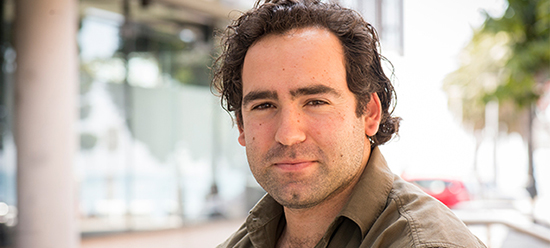Search of Communist archives uncovers discussion of toilet rolls, socks and Russian fears of invasion
Research news

Dr Filip Slaveski, you read things that seem not to be that important but over time they gain importance.
In a tech-savvy, Google connected world where most knowledge can be downloaded in an instant or captured in a three minute video, Alfred Deakin Institute for Citizenship and Globalisation's, Dr Filip Slaveski's latest research trip to Russia and the Ukraine would appear positively old school.
The research, which has involved travel to Moscow and Kiev, manually trawling through newly declassified documents from the Communist state archives, has unveiled a fascinating insight into the Soviet psyche post World War II.
It will ultimately contribute to our knowledge of the period and the issues countries face when trying to rebuild after war.
"There is no Google search there," Dr Slaveski laughed as he reflected on the effort required to find the significant material. "The archives are stuck in time, there are paper records or microfilm dated in the 1950s and the staff have been there for 40 or 50 years."
“There are no maps of what you are looking for, nor any real instruction guide or handy video to find the answers you are looking for.
“You have to search for it.”
Dr Slaveski’s research is part of a prestigious, federally funded Australian Research Council, Discovery Early Career Researcher Award (DECRA) which is investigating the chaotic and violent transition from war to peace in Soviet-occupied Europe after World War II.
Dr Slaveski is particularly interested in the difficulties of post-war reconstruction and the mass violence which occurred in Ukraine and the Baltics during the period.
“The documents are important because they talk about the post war situation across the Soviet Union and Soviet occupied Europe as well as its contemporary echoes,” he said.
“What happened in Moscow influenced what happened in Europe and the West.”
Dr Slaveski said the documents talked about the difficulty of establishing Soviet rule in these areas, the dysfunction, the material food shortages and chaos at the end of the War.
“The perception has been that the War ended in 1945 and people went back to their normal lives,” he said.
“Yet for people in the Soviet Union there was no normal to go back to.
“Stalin’s rule was a succession of crises and the War was the greatest crises ever. “It had been preceded by mass collectivism, famine, the great purge and the war with Finland.
“So what does the society go back to? “They have to lurch forward into an unknown space.”
Dr Slaveski said Westerners tended to interpret the actions of the Soviet government, through its actions and threats to regional stability during the Cold War.
“Our understanding of the Cold War and our lack of knowledge of that period has led to a misunderstanding of Russian thinking,” he explained.
“It doesn’t excuse what they did, but it helps us understand where they were coming from.”
Dr Slaveski said in reality what was driving the Russian psyche was a constant fear of destruction and invasion.
“Even at the height of their power this was how they felt and what they feared. “You can see remnants of this in the actions and responses of Putin.”
Dr Slaveski it was exciting searching through the archives.
“Not only do you have access to documents that have been rarely accessed before, but they are so rich in content and meaning,” he said.
“You can see echoes in the contemporary events shaping the Ukraine at the moment.”
Dr Slaveski said while the archives were exciting they could also be incredibly boring, with lengthy discussions of how many toilet rolls or pairs of socks needed to be provided to this or that factory.
“It takes incredible patience and discipline to get to the things that are of interest to you,” he said.
“You need to let the documents talk to you.
“You have to sit there and immerse yourself in the period to understand and grasp what is going on.
“You even read things that seem not to be that important but over time they gain importance.”
Dr Slaveski said in one instance he read about the pay and leave allowances for the security forces complaining that their pay hadn’t risen.
“It become significant when I took into account that the people writing these requests were apart, the discussion was occurring during a time of increased level of bribery and corruption and they saw State officials are being paid greater amounts.
“You can then start to place these tensions when the state is in chaos and crime is on the rise.”
Dr Slaveski said there was an innocent honesty in the records.
“The people writing them didn’t know that the records would be declassified,” he said.
“The documents were never meant to be seen by a researcher, nor a foreigner, so people were writing to each other, they never had any concern that things would go beyond that circle.
“So it was fundamentally honest reporting, though often strategic, and we have had access to it.”
Dr Slaveski said he was stoked with the success of the trip and the help from the archivists.
“Initially I was only going to have time in Kiev to scout out what was available,” he said.
“But when I explained to the archivists how far I had come, I was able to photograph the documents I needed.
“It saved me months of work. “What I was doing in Russia I was also going to be doing in the Ukraine.”
Dr Slaveski said it was a fascinating period.
“Historians have not looked at this history much until now," he said.
Contact: Sandra Kingston
Phone: 03 9244 5274
